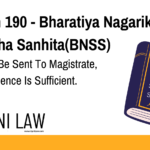Code:
When an act is an offence by reason of anything which has been done and of a
consequence which has ensued, the offence may be inquired into or tried by a Court within
whose local jurisdiction such thing has been done or such consequence has ensued.
Explanation
Section 199 BNSS provides flexibility in determining jurisdiction for trials where an offence is connected to both an act and its consequences. This ensures that cases can be prosecuted either where the wrongful act occurred or where its effects were felt.
This provision is particularly useful in cases involving:
- Cross-jurisdictional crimes (e.g., cybercrimes, financial fraud, terrorism).
- Crimes causing harm at a different location from where they were initiated.
Key Provisions:
- Dual Jurisdiction: A case may be tried in the location where the act was committed or where its consequence occurred.
- Flexibility for Legal Proceedings: Courts have discretion to determine the most appropriate venue for trial.
- Applicability to Modern Crimes: This is crucial in offences like cyber fraud, terrorism, or online defamation, where harm is caused in a location different from where the act was initiated.
Illustration
Example 1: Cyber Fraud Committed in One City, Loss Occurs in Another
A scammer in Delhi hacks a bank account belonging to a victim in Mumbai, causing financial loss.
- The case can be tried in Delhi (where the act was done) or in Mumbai (where the consequence ensued).
Example 2: Defamation with Widespread Impact
A defamatory article is published in Kolkata, but its effects harm a person living in Chennai.
- The case may be tried in either Kolkata or Chennai.
Example 3: Terror Attack Planned in One State, Executed in Another
A terror plot is planned in State A but executed in State B, leading to casualties.
- The case may be tried in either State A (where the act was done) or State B (where the consequence occurred).
Common Questions and Answers on Section 199 BNSS
1. Where can an offence be tried under Section 199?
- Answer: A case can be tried in the jurisdiction where the act was committed or where its consequence occurred.
2. Why is this provision important?
- Answer: It ensures that crimes with cross-jurisdictional effects (e.g., cybercrimes, terrorism, financial fraud) can be prosecuted where they caused harm.
3. Can a victim file a complaint in their own jurisdiction?
- Answer: Yes, if the consequence of the offence has affected the victim’s location, the trial can take place there.
4. Does this apply to online crimes?
- Answer: Yes, offences like cyber fraud, defamation, or hacking often involve an act committed in one location and a consequence in another, making this provision essential.
Conclusion
Section 199 BNSS ensures fair trial jurisdiction for offences where both an act and its consequences are relevant. This allows courts to prosecute cases in locations most impacted by the crime, particularly in cross-jurisdictional offences.











